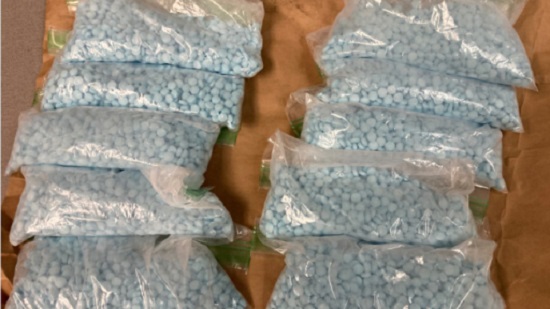Grand Rapids, MI – Four men were sentenced to lengthy prison terms this week following their involvement in a major drug trafficking operation in West Michigan. Federal authorities revealed that the individuals had been caught distributing large quantities of illegal drugs, including fentanyl-laced pills, methamphetamine, and cocaine.
The investigation, which led to their arrests and convictions, highlights the ongoing challenges authorities face in combating the opioid crisis and the proliferation of illicit drugs in the region.
Drug Seizures and Arrests
In March 2024, 33-year-old Lonnie Morrow was stopped by law enforcement in Kalamazoo County. During the traffic stop, officers uncovered a staggering 10,863 pills that appeared to be 30mg Oxycodone but were actually laced with over one kilogram of fentanyl, a potent synthetic opioid. A subsequent search of Morrow’s apartment revealed additional drugs, including over 170 grams of cocaine, amphetamine, and morphine pills, along with three firearms. Morrow was sentenced to 15 years and 8 months in federal prison after pleading guilty to charges of possession with intent to distribute fentanyl and cocaine.
Chief U.S. District Judge Hala Y. Jarbou, who presided over the case, emphasized the added danger of fentanyl when it is disguised in pill form. “Fentanyl is dangerous on its own, but when it’s disguised as a prescription drug, it’s even more lethal,” Judge Jarbou said during sentencing.
A History of Drug Dealing
In another case, 50-year-old Thomas Davis was sentenced to 17 years and 6 months in prison for possessing and distributing methamphetamine and cocaine. In July 2024, officers found nearly 18 pounds of methamphetamine and over 70 grams of cocaine in Davis’ Kalamazoo County apartment. Davis, a repeat offender, had been under supervised release after a 2008 federal conviction for drug distribution. Despite his previous convictions, Davis continued to engage in illicit drug trafficking, selling large quantities of methamphetamine to an informant.
Fentanyl Found in Family Home
Dyland Hughes, 32, was sentenced to 5 years and 10 months in prison after authorities discovered 500 grams of fentanyl and over 100 grams of cocaine hidden in a bedroom of his mother’s Kalamazoo County home. Hughes pleaded guilty to charges of possession with intent to distribute fentanyl and cocaine, and his sentence serves as a stark reminder of the widespread impact of drug trafficking, even within family environments.
Ongoing Efforts to Combat the Crisis
Rene Ruiz, 52, was sentenced to 16 years in prison after authorities found nearly two pounds of counterfeit Oxycodone pills in a Grand Rapids storage unit. The pills, which were later determined to contain fentanyl, were part of an operation that sought to deceive users into thinking they were consuming legitimate prescription drugs. Ruiz, who had a history of drug-related offenses, had been previously incarcerated multiple times.
U.S. Attorney Andrew Birge of the Western District of Michigan, who oversaw the cases, underscored the seriousness of the issue in a statement. “One pill can kill,” Birge warned, stressing that drug networks are manufacturing and distributing counterfeit pills in large quantities, deceiving the public with pills that look legitimate but are laced with deadly substances like fentanyl.
These convictions and sentences come as part of a broader effort by federal and local authorities to dismantle drug trafficking networks and reduce the availability of dangerous drugs like fentanyl, which continues to devastate communities across the country.
The Bigger Picture
While the sentences handed down this week send a strong message to those involved in drug trafficking, experts caution that the problem is far from over. As criminal networks continue to exploit the opioid epidemic, the need for continued law enforcement vigilance, along with comprehensive prevention and treatment strategies, remains critical. Despite these convictions, fentanyl and other illicit drugs continue to claim lives in Michigan and beyond, underscoring the urgent need for ongoing action.
The sentences also reflect the rising concern over the growing number of counterfeit pills entering communities, often unknowingly consumed by individuals who believe they are using a prescription medication. As drug traffickers become more sophisticated in their methods, the risk of overdose and death remains a constant threat.
A Call to Action
As the opioid crisis continues to claim lives, law enforcement officials are urging the public to remain vigilant and aware of the dangers of counterfeit drugs. Authorities are calling for a concerted effort to combat the proliferation of fentanyl and similar substances, which have become increasingly common in street-level drug markets.
The case of Lonnie Morrow, Thomas Davis, Dyland Hughes, and Rene Ruiz serves as a stark reminder of the dangers posed by illegal drugs and the need for continued efforts to protect communities from the deadly consequences of drug trafficking.







